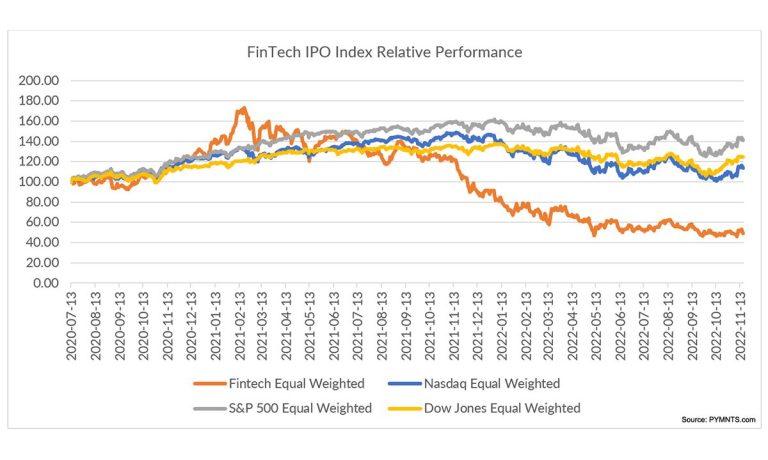Huize’s 40% Rally Leads FinTech IPO Index into Shortened Holiday Week

Not everything was about crypto-land these past several days in the tech space.
Of course, you’d be hard-pressed to think that anything happened other than FTX’s meltdown, bankruptcy filing, and seismic shock to the issuers and users of bitcoin and stablecoins.
But then again, earnings season continued to roll onward, reaching the (almost) end of its run for the September quarter. For the past five sessions and headed into Friday’s action and next week’s shortened schedule, the FinTech IPO Index was up 7.1%. Year to date, the group is still down 46.6%, which gives you a sense of just how disenchanted tech investors have become with the space.
And yet, on a name-by-name basis, there were some significant gains to be seen.
Huize Holding Limited, the digital insurance platform focused on Chinese consumers, reported that gross written premiums across the platform increased by 29.4% to RMB1.249 billion. The cumulative number of insurance clients served increased to approximately 8.3 million, which helped drive revenues 34% higher in the quarter.
Cunjun Ma, CEO, said on the conference call with analysts that “during the quarter, we continued to make progress on implementing our strategic road map to build an omnichannel digital insurance service ecosystem that integrates agents, businesses and customers.” Renewal premiums increased by 24.1% year-over-year.
Chinese Firms in the Spotlight
The volatility among several names, especially firms operating in China, was spotlighted in Futu’s 24% rally coming into next week’s earnings report.
PaySafe was up 21.7%, on the heels of its earnings late last week that showed a total payment volume of $32.5 billion was up 5%. And just ahead of earnings, the company said last week, too, that its prepaid eCash solution “paysafecard” is now accepted as a payment option on Microsoft.com and Xbox.com in the U.S. and select countries in Europe.
Not all earnings reports boosted stocks. Flywire reported 40% revenue growth in the September quarter, and total payments volumes up 33%. The stock was off 5% since last week.
CEO Mike Massaro noted on the call that “while we saw strength in multiple aspects of our education business and delivered strong overall revenue growth, we experienced less revenue growth than expected from students originating from China. The combination of decline in visa issuance and COVID-related travel obstacles, as well as changes in destination, may have impacted growth.”
Toast lost 7.7%. As reported in this space, management remained sanguine about the potential in the ResTech space.
“Over the past year, the percentage of total SMB restaurant locations in markets where we have over 20% penetration has increased by more than five times,” Toast CEO Chris Comparato told analysts. “When you combine the significant untapped SMB opportunity with our nascent share in the enterprise and international segments, we still have a long runway of growth ahead.” The company currently has a presence in 74,000 restaurant locations, management said.
At times this past week, earnings were not the only key driver. Dlocal was the most notable decliner, skidding 51%. As reported by Financial Times, short seller Muddy Waters opened a position in the name based on what Carson Block, the Texas-based company’s chief investment officer, said is an “unnecessarily complex” corporate structure.
“There is inconsistent disclosure around the value of payments completed through dLocal’s platform,” he said, as quoted in FT. The payments firm, for its part, has fired back in a statement, saying “the report contains numerous inaccurate statements, groundless claims and speculation. Short seller reports are often designed to drive the stock price downwards to serve the short seller’s interests to the detriment of the company’s shareholders.” The report comes in the wake of earnings reported this month where dLocal disclosed a 51% gain in payments volume to $2.7 billion, year on year.